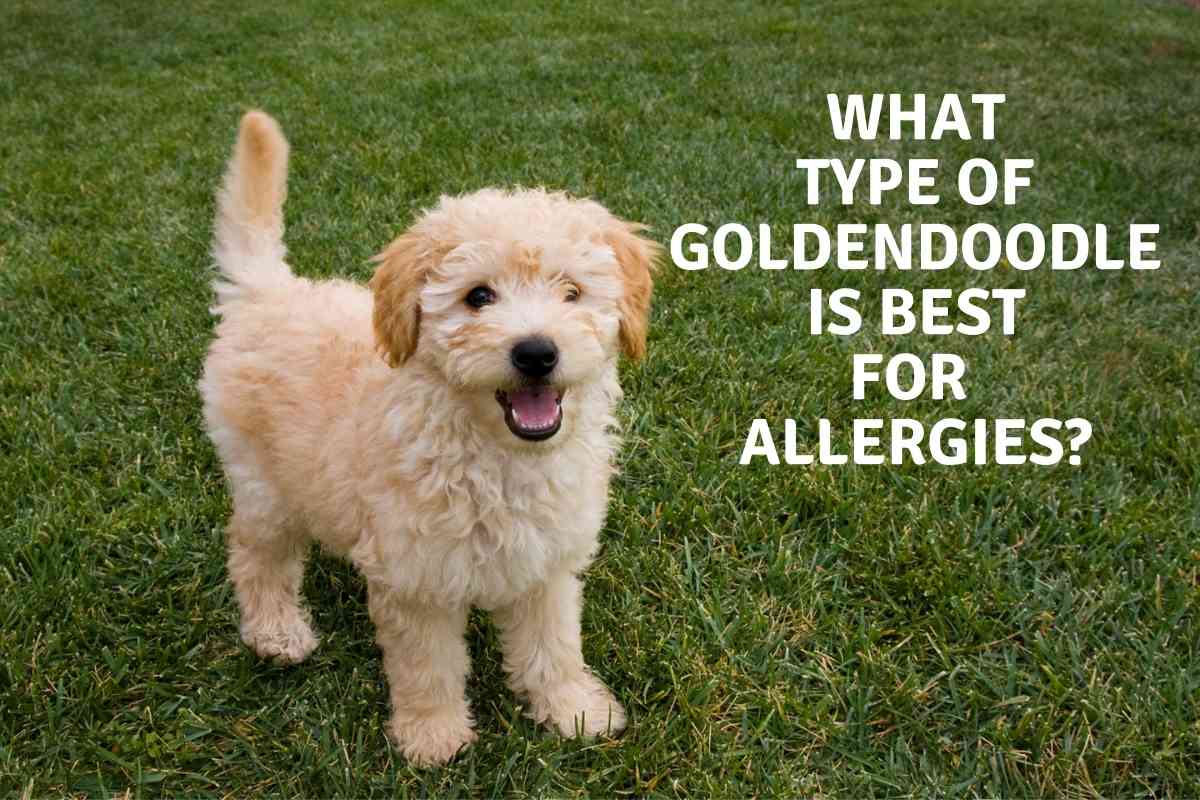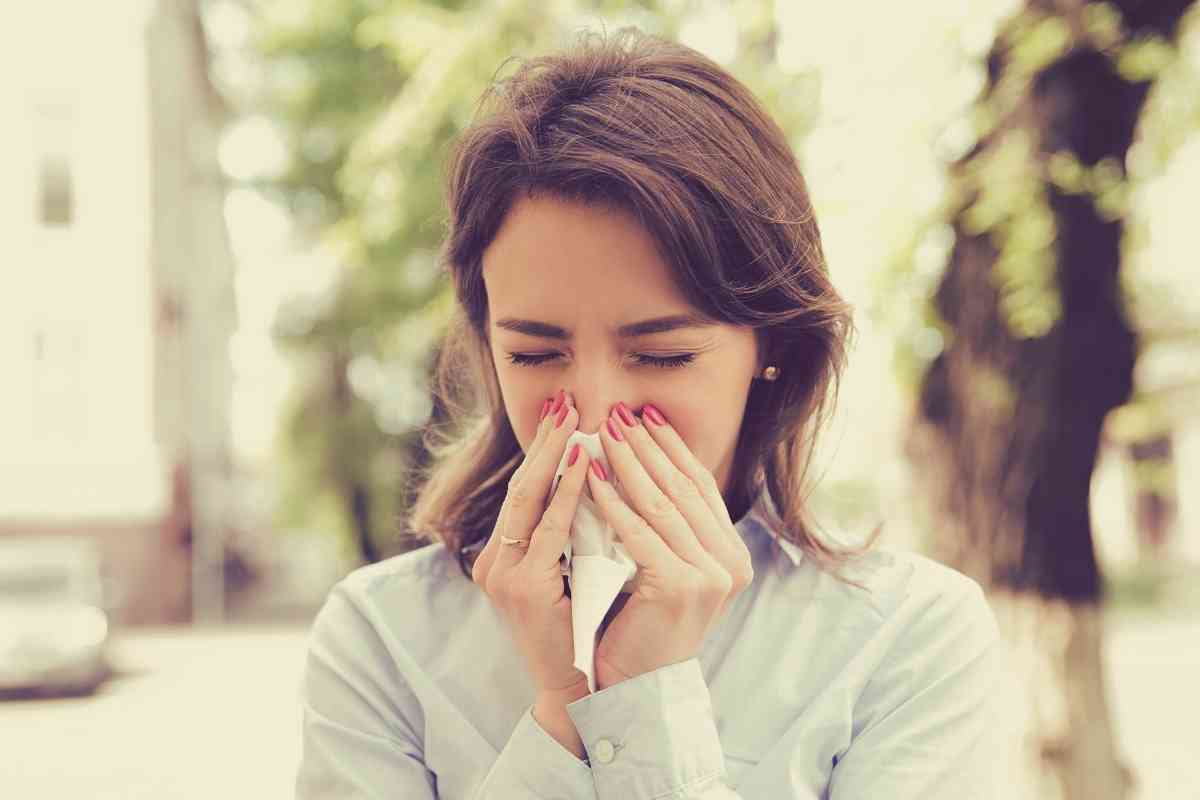What Type of Goldendoodle Is Best For Allergies?
Many people have allergies to different things. Some of these things even include dogs and cats. If you are allergic to dogs, you may be looking for a dog breed best for your allergies. While there is not a dog that is 100% allergen-free, a few breeds will help you not have severe allergic symptoms when you are around them.

What Type of Goldendoodle is best for allergies?
The F1B Goldendoodle is best for people who have allergies. This Goldendoodle is more Poodle than Golden Retriever, so their coats are more likely to be hair than fur, resulting in less shedding and making them more hypoallergenic than other types of Goldendoodles.
This crossbreed sheds the least and causes people to have the least amount of allergy issues.
What is an F1B Goldendoodle?
An F1B Goldendoodle is a low-shedding Goldendoodle and is the best generation of Goldendoodle to get for someone who has allergies.
This generation is 75% Poodle and 25% Golden Reviver. This gives the mix more of the poodle traits and curly hair.
These Goldendoodles tend to have the lowest amount of shedding and are the least likely to cause you to have allergies to the different generations of Goldendoodles.
If you are not able to find an F1B Goldendoodle, your next best option is F2B. This crossbreeding is 62.5% Poodle and 37.5% Golden Retriever.
The breed is made by crossing F1 Goldendoodles to F1B Goldendoodles. These dogs are very light shedders and only produce a small number of allergens.
You may be lucky with F1 or F2 Goldendoodle and have a dog that does not shed very much, thus does not cause you to have allergy issues.
These generations can be somewhat unpredictable as far as shedding and allergens. This would be a gamble for you unless your puppy has had DNA testing to determine their hair type.
Are Goldendoodles Hypoallergenic?
Since Doodles are Poodle mixes, they are often described as hypoallergenic dogs.
There is no scientific evidence showing that any particular breed or crossbreed is hypoallergenic. There are cases where people who have milder allergies will not react as severely to a particular breed of dog.
Still, no reputable breeder will 100% guarantee that their dogs will be hypoallergenic. Your pet allergies to a dog can be very different with each you come into contact with.
Even dogs within the same litter can cause allergy sufferers to have different reactions.
If you have allergies to dogs or even other pets, it would be best to spend time with several different breeds of puppies to see how you react to them. If you do have allergies to any of these puppies, you will need to look for a dog breed that is low shedding and see if you have allergic reactions to these dog breeds too.
Some allergists think that a Goldendoodle’s coat is more like a poodle, which is very curly, causing the dog not to shed as much. This will help keep any loose skin dead skin trapped closer to their skin and not just freely moving around your house.
This would help a person who reacts to pet dander because there is less dander in the house to trigger their allergy symptoms. However, other allergens like your dog’s saliva, urine, and natural oils can cause allergic reactions, too, not just dead skin cells.

Why Do Goldendoodles Not Shed as Much as Other Dogs?
The reason that Goldendoodles do not shed much is that they do not have fur; they have hair.
Most people think that fur and hair are the same and use the words interchangeably.
They are not entirely wrong. Looking at the makeup of hair and fur, it does contain the same thing. Microscopically you also cannot tell the difference between hair and fur.
The difference between fur and hair is when you look at how often the hair and fur are shed.
Your Goldendoodles has hair. This means their hair is continually growing, and that is why you have to have these dogs groomed.
If you never groom your Goldendoodle’s hair, eventually, their hair will be very long. The fur will grow to a certain length for dogs who have fur and then fall out.
This is seen in short hair dogs, like Labs or Chihuahua. These breeds of dogs have fur. They will never need to cut their hair, and their hair will only grow so long.
Can You Test for Hair Type In Goldendoodles?
Even though the curliness of a Goldendoodle’s hair usually correlates to the non-shedding and hypoallergenic features, this still may not always hold.
An easy way to know for sure that your Goldendoodle’s coat type is to look at your dog’s genes.
In these genetic tests, you will want to specifically look at the Furnishing Gene and Shedding Locus Gene to determine if your Goldendoodle is a non-shedding dog or hypoallergenic.
It is best to get a DNA test on your Goldendoodle if you want to figure out your Goldendoodle’s genetic structure. Genetic testing can be done. These tests look for the Cu locus gene, also known as the KRT71 gene.
This will help determine whether your Goldendoodle has a straight coat, wavy coat, or curly coat. Generally, the less Cu locus gene your Goldendoodle has, the more straight the hair coat will be.
Goldendoodles are a mix of different generations of Goldendoodles, usually bred to Standard Poodle.
It will more likely be that the coat of the Goldendoodle will be wavy or, at the very least, have the recessive Cu Locus gene. Your vet can help your find a reliable DNA test for your Goldendoodle to determine what kind of coat they will have.
By looking at their coat as a puppy, you can usually tell whether your Goldendoodle will have a straight coat or a curly coat. Goldendoodle litters will have a mix of different coats; some puppies will have straight coats to have wavy coats, and some puppies will have curly coats.
Once your puppy loses the puppy hair, their adult hair does not usually change from one type to another.
Do Goldendoodles Shed More As Puppies?
Many people say that their Goldendoodle puppies shed less when they are a puppy, and as they get older, they tend to shed more.
There are a few things that can cause your Goldendoodle to shed when they are a puppy. One thing is stress. Any increase in stress can trigger your Goldendoodle puppy to start to shed spontaneously.
This often occurs when you first bring home your new puppy.
This is a very stressful time for them to leave behind their family and first home and start a new life with their new family. Some puppies shed a lot throughout their time as a puppy.
This would be a good indicator that your Goldendoodle will most likely shed a lot as an adult. This is not always true. Some Goldendoodles are constantly full of many surprises!
Your Goldendoodle puppy will have a soft, fluffy, single coat.
This coat is not necessarily a good indicator of what your Goldendoodle will look like when you are an adult. As your Goldendoodle gets older, their coat will become darker, stiffer, and thicker.
Your Goldendoodle will shed the puppy coat around 6 to 10 months of age. This is normal and not a cause for alarm.
Your Goldendoodle may even take a full year to develop their mature coat. Since a Goldendoodle will shed less than other breeds, you should pay attention to their grooming when their adult coat starts to come in.
The puppy coat will shed but may remain trapped below other hair. This causes their hair to become tangled into large mats. This is seen more frequently as the adult coat starts to grow. It is best to
How To Decrease Shedding and Allergens From Your Goldendoodle
If you are allergic to your pet’s dander, there are some things that you can do at home to help decrease the dander that your dog is leaving behind.
These are five things that can be done to decrease the amount of pet dander in your house:
Bath Your Goldendoodle Often
When you bathe your dog, you remove the dander on your Goldendoodle’s skin. It would be best to bathe your Goldendoodle at least once a week to help control their dander.
In severe cases, you may want to bathe your Goldendoodle every few days. The more often you are bathing your Goldendoodle, you can cause their skin to get dry.
Be sure that you are using shampoo or even conditioner to help your dog’s skin.
Brush Your Goldendoodle
This will prevent them from leaving extra hair or dander on your furniture and around the house.
Groom Your Goldendoodle To Have Shorter Hair
Keeping your Goldendoodle groomed short will also help. They will have less hair and allergens to spread around your house. Dogs with longer hair will lick and clean themselves constantly.
This gets the proteins found in their saliva on their hair and eventually on you or your house. Your dog’s groomer can keep your Goldendoodle’s hair cut short to help them be more hypoallergenic.
Give Your Dog A Skin Supplement
Giving your dog a skin supplement with Omega Fatty Acids will help their skin and coat.
It will be brittle if your Goldendoodle has a dull, dry coat. This will cause their hair to break and fall out more often.
Fatty acid supplements or fish oil supplements can be added to your Goldendoodle’s diet to help keep their fur nice and shiny. This will also keep your Goldendoodle from shedding as much.
Use A Shampoo Designed for Shedding
Certain shampoos help decrease the amount of hair that your Goldendoodle sheds.
While your Goldendoodle will still shed some, these shampoos are used to help them shed less. Oatmeal shampoos are one popular shampoo that you can purchase to help stop your Goldendoodle from shedding as often.
Final Thoughts
If you have allergies to pets and are looking at getting a Goldendoodle, the F1B is the best generation to get to make sure that you will not have any allergy issues.
You still may have some allergy issues with this breed. It will be less than with any of the other generations.
Also, following these few tips and tricks, you will decrease the dander that your Goldendoodle produces and keep yourself allergen-free.